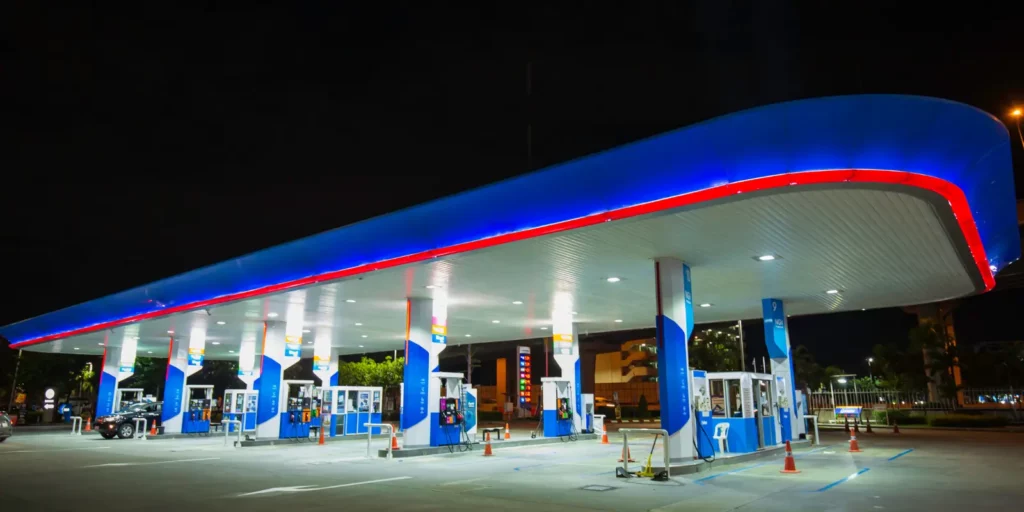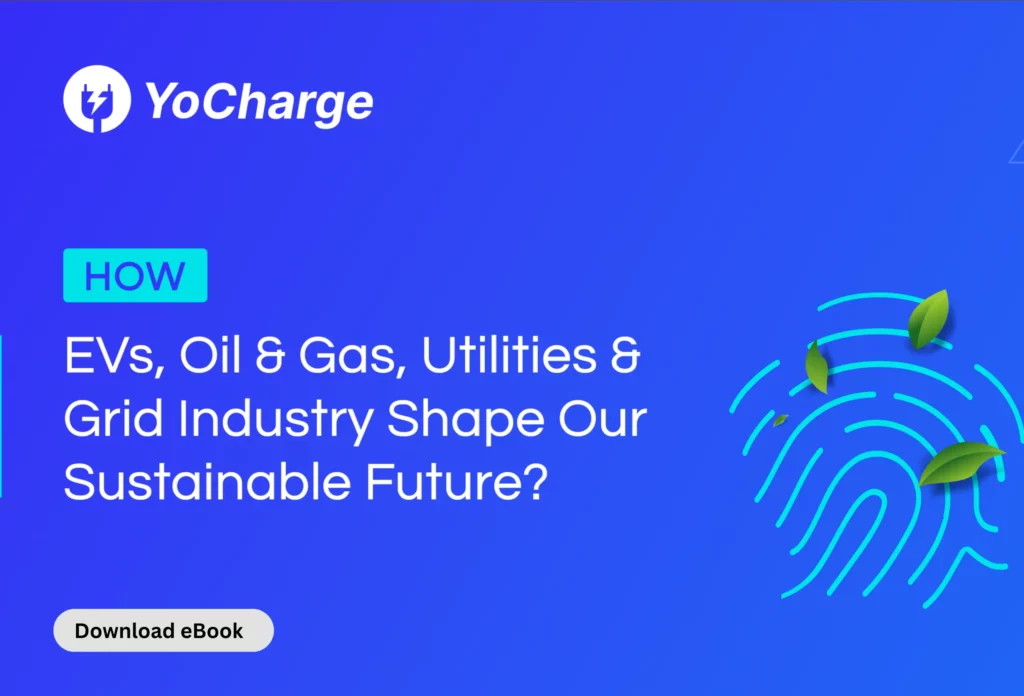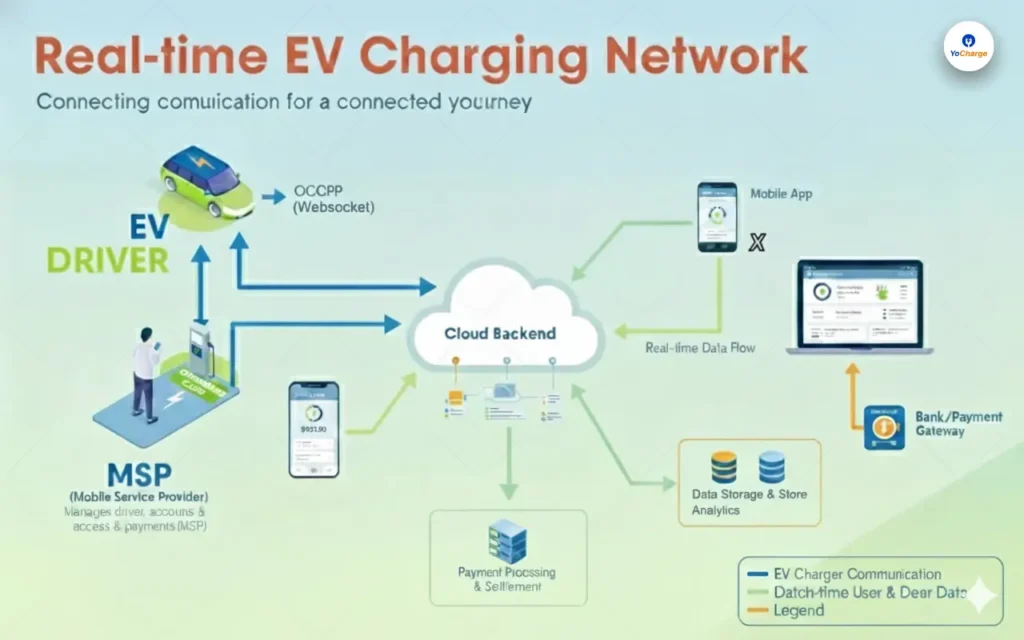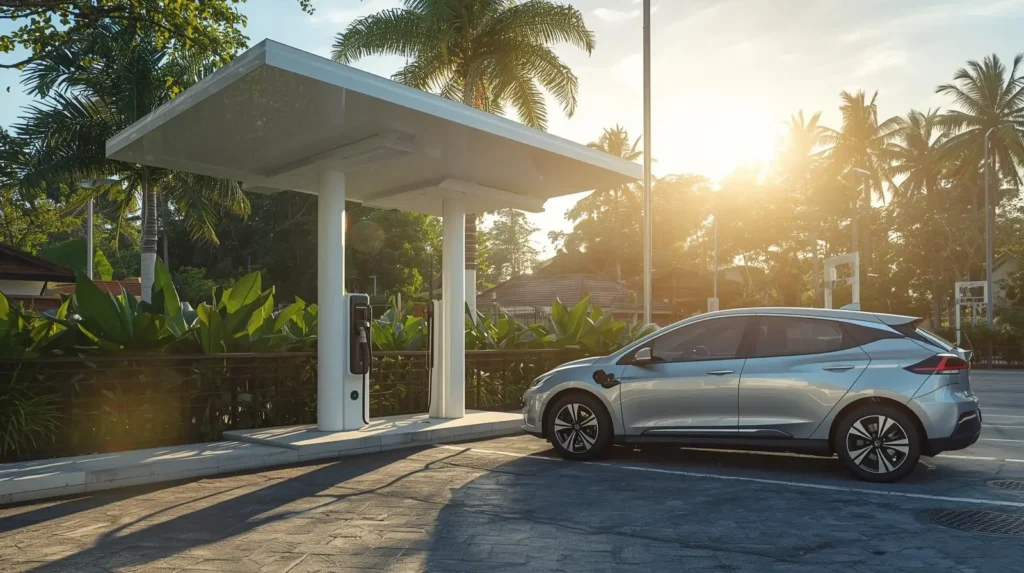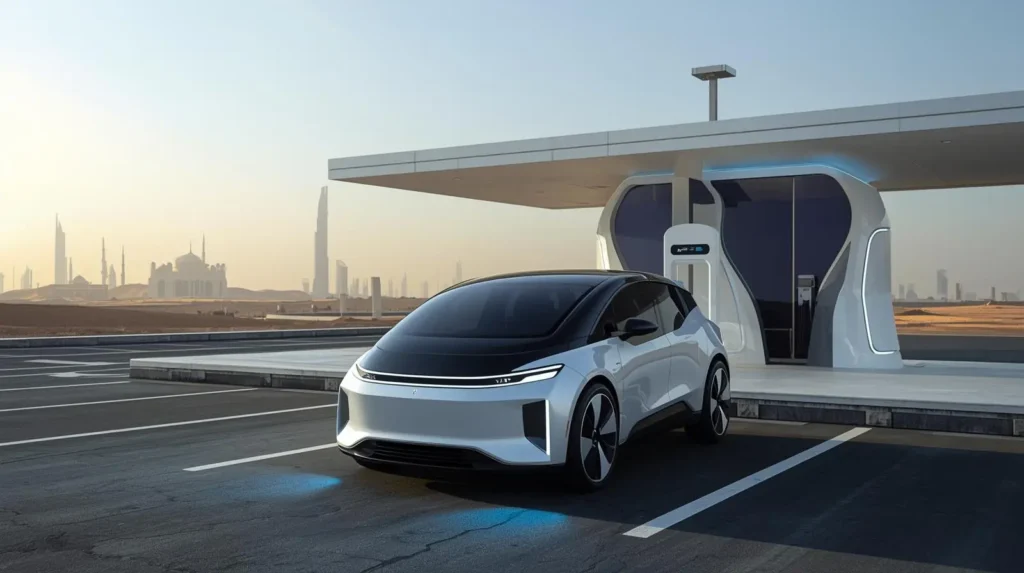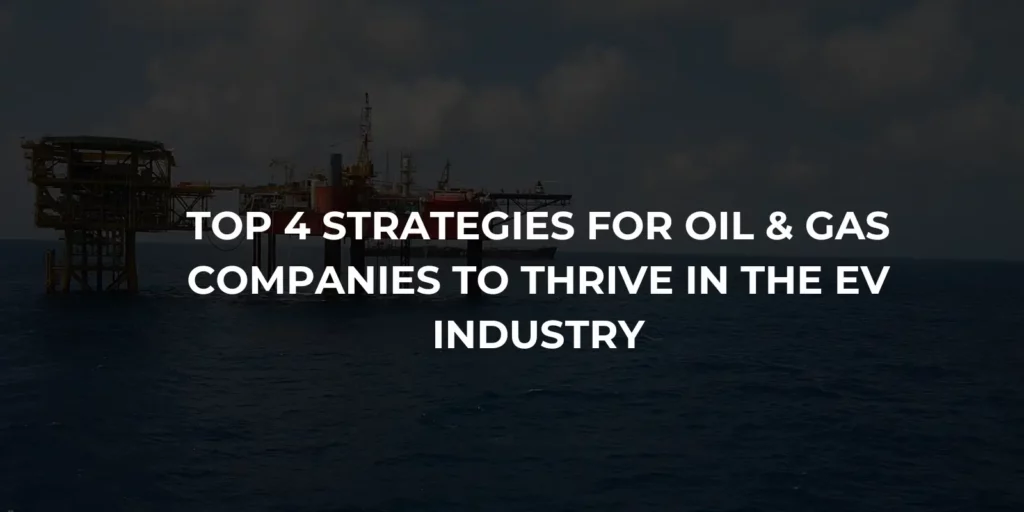
The transportation industry is shifting towards electric vehicles (EVs), posing a challenge and opportunity for oil and gas retailers to participate in the growing EV charging industry. The shift towards electric mobility presents new revenue streams and opportunities for growth, such as leveraging existing assets to position themselves as key players in the EV charging market.
This article provides actionable strategies for oil and gas retailers to take part in the EV charging industry, including diversification of energy portfolios, technology adoption, sustainable practices, and strategic partnerships.
Why Oil And Gas Retailers Should Diversify To EV Charging Industry ?
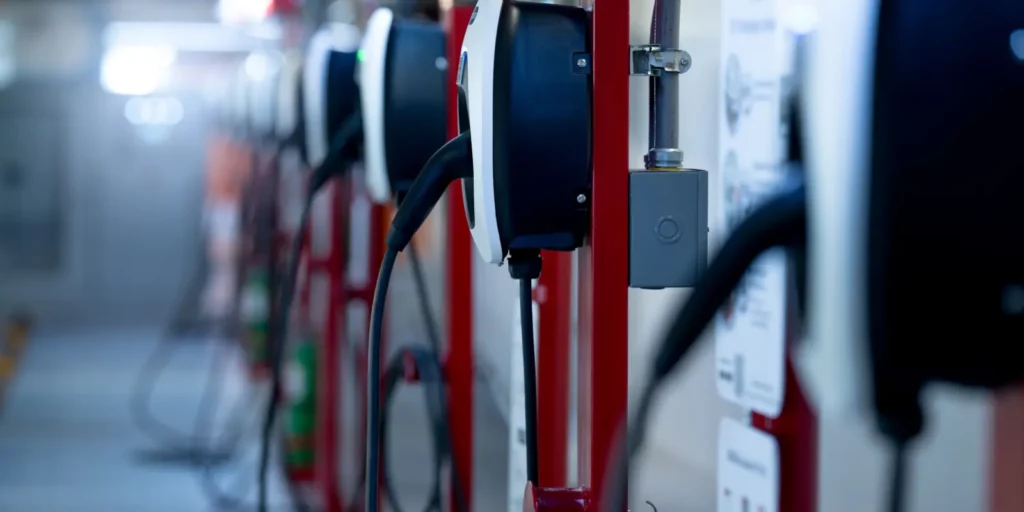
The global electric vehicle market has been experiencing remarkable growth, with the market size reaching USD 255.54 billion in 2023 and projected to reach around USD 2,108.80 billion by 2033, showcasing a notable Compound Annual Growth Rate (CAGR) of 23.42%. The commercial use segment is expected to grow significantly due to factors like rising fuel prices, government regulations on emissions, and the increasing adoption of electric vehicles.
In the U.S., the electric vehicle market size was valued at USD 49.1 billion in 2022 and is forecasted to register a CAGR of over 15.5% between 2023 and 2032.
Oil and gas retailers should diversify into the EV charging domain to future-proof their businesses and tap into new revenue streams. The transportation industry is rapidly shifting towards electrification, driven by legislative regulations and the increasing adoption of electric vehicles (EVs). By entering the EV charging market, fuel retailers can leverage their existing assets like strong brands, retail networks, loyalty programs, and real estate to successfully transition.
Major oil and gas companies have already made significant strides in this direction through direct investments or acquisitions of EV charging infrastructure companies. Diversifying into EV charging offers several key benefits for oil and gas retailers:
- Investing in Public Charging Infrastructure: Fuel retailers can capitalize on government funding aimed at boosting electric transport by rolling out EV infrastructure, including fast DC charge points, to meet the growing demand for high-speed charging.
- Servicing Commercial Fleets: As businesses electrify their fleets, fuel retailers can provide public, workplace, and residential charging services to fleet operators, thereby expanding their consumer reach and entering new markets.
- Providing a Point of Interface for Charging: Developing mobile apps that facilitate EV drivers in finding, using, and paying for charging services can enhance customer experience and engagement
Strategy 1: Entering The EV Charging Market As Charge Point Operators (CPOs)
Oil and gas retailers can strategically enter the electric vehicle (EV) charging industry by becoming Charge Point Operators (CPOs). A Charge Point Operator (CPO) is a crucial player in the electric vehicle (EV) charging industry responsible for building, installing, and maintaining EV charging systems and stations. It can be a great opportunity for oil and gas retailers looking to diversify their business and capitalize on the growing demand for electric mobility.
The key points in this strategy are: establishing EV Charging Stations at strategic locations, providing convenient and reliable charging services, and enhancing customer experience to build a loyal customer base in the market.
If you are an oil and gas retailer and want to became a charge point operator(CPO), consider partnering with YoCharge. Our White Label EV Charging Software will take care of your EV charging business. With features like customizable branding, intuitive user interface, remote monitoring, payment management, advanced analytics, etc. our platform ensures seamless management for your EV charging business, enabling you to focus on growth and profitability.
Strategy 2: Diversification Of Energy Portfolio In EV Industry
2.1 Investing In Renewable Energy Sources
Oil & gas retailers can seize opportunities in the electric vehicle (EV) charging industry by investing in renewable energy sources. This strategic move allows oil and gas retailers to diversify their portfolios, reduce carbon emissions, and align with the global shift towards sustainable energy solutions.
Oil and gas firms can use their expertise and resources to support renewable energy projects, including offshore wind, EV charging stations, and hydrogen production.
2.2 Partnering With Renewable Energy Companies
Partnering with renewable energy companies helps oil and gas retailers benefit from their knowledge and resources for supporting renewable energy projects. This collaboration allows access to new markets, technologies, and growth chances in the renewable energy sector.
By working together, they can create integrated solutions that combine renewable energy generation with EV charging infrastructure, making the energy system more sustainable and efficient.

Strategy 3: Innovation And Technology Adoption In EV Industry
3.1 Developing Advanced Battery Technologies
Embracing innovation in advanced battery technologies is a crucial strategy for oil & gas retailers looking to thrive in the electric vehicle (EV) industry. Research and development in high-performance batteries, such as lithium-ion and solid-state batteries, can enhance energy storage capabilities, increase vehicle range, and accelerate charging speeds.
By investing in cutting-edge battery technologies, oil & gas firms can position themselves at the forefront of the EV market, catering to the growing demand for efficient and sustainable energy solutions.
3.2 Investing In Smart Grid Solutions For Efficient Energy Management
Another key aspect of innovation for oil and gas retailers in the EV charging industry is investing in smart grid solutions for efficient energy management. Smart grids enable real-time monitoring, control, and optimization of energy distribution, facilitating seamless integration of renewable energy sources and electric vehicle charging infrastructure.
By deploying smart grid technologies, oil & gas retailers can improve grid reliability, reduce operational costs, and support the transition to a more sustainable energy ecosystem.
Strategy 4: Partnerships And Collaborations
4.1 Forming Alliances With EV Manufacturers
Establishing alliances with electric vehicle (EV) manufacturers is a strategic move for oil and gas retailers to integrate their supply chains and capitalize on the growing demand for electric mobility. By partnering with EV manufacturers, oil & gas firms can streamline production processes, enhance product quality, and ensure a seamless flow of components and materials.
Research indicates that supply chain integration through strategic alliances can lead to cost savings, improved operational efficiency, and enhanced market competitiveness.
4.2 Collaborating With Tech Companies
Collaborating with technology companies for data analytics and predictive maintenance solutions is another key strategy for oil and gas retailers in the EV charging industry. By leveraging advanced technologies like data analytics, artificial intelligence, and the Internet of Things (IoT), companies can optimize asset performance, reduce downtime, and enhance operational efficiency.
Predictive maintenance solutions can help oil & gas firms improve equipment reliability, minimize maintenance costs, and increase productivity.
4.3 Partnering With EV Charging Infrastructure Companies
Another key strategy for oil and gas retailers in the EV charging industry is through acquiring or partnering with EV charging infrastructure companies. This approach enables oil & gas players to tap into the expanding market for EV charging stations and services, leveraging their existing assets like retail networks and real estate to establish a strong presence in the EV charging sector.
By strategically aligning with EV infrastructure providers, oil and gas retailers can enhance their offerings, cater to the growing demand for electric mobility, and position themselves as key players in the evolving energy landscape.
Strategy 5: Sustainable Practices and ESG Initiatives In EV Industry
5.1 Implementing Carbon Reduction Strategies
Adopting carbon reduction strategies is essential for oil & gas retailers aiming to thrive in the electric vehicle (EV) industry while promoting sustainability. By implementing measures to reduce carbon emissions across their operations, such as optimizing production processes, enhancing energy efficiency, and investing in carbon capture technologies, companies can mitigate their environmental impact and align with global climate goals.
5.2 Engaging In Community Outreach And Environmental Stewardship Programs
Participating in community outreach and environmental stewardship programs is a crucial aspect of sustainable practices for oil and gas retailers in the EV charging industry. By engaging in initiatives that promote environmental conservation, support local communities, and encourage sustainable development, retailers can build trust, enhance their brand reputation, and demonstrate their commitment to social responsibility.
Research shows that companies with strong Environmental, Social, and Governance (ESG) practices tend to perform better financially and attract a wider investor base.
Suggested Reads: Role Of Power Utilities In Driving Positive Change For The EV Industry By 2030
The Final Words
Oil and gas retailers can grow in the electric vehicle (EV) industry by diversifying their energy portfolios, embracing innovation, adopting sustainable practices, and forming strategic partnerships. By investing in renewable energy sources and partnering with EV charging infrastructure companies, oil and gas firms can expand their market presence and cater to the growing demand for electric mobility.
Innovation in advanced battery technologies and smart grid solutions enables companies to enhance energy storage capabilities, optimize energy distribution, and support sustainable energy ecosystems. Implementing carbon reduction strategies and engaging in community outreach programs demonstrate a commitment to environmental stewardship and social responsibility, enhancing brand reputation and financial performance.
Finally, forming alliances with EV manufacturers and collaborating with technology companies for data analytics and predictive maintenance solutions streamlines production processes, improves operational efficiency, and enhances market competitiveness.
If you are an Oil and Gas retailer and want to expand in the EV charging industry, consider partnering with YoCharge to accelerate your journey into the electric vehicle charging market and maximize your opportunities for growth and sustainability. Our White Label EV Charging Software will help you to grow and expand the business without any limits. Contact Us Now!
